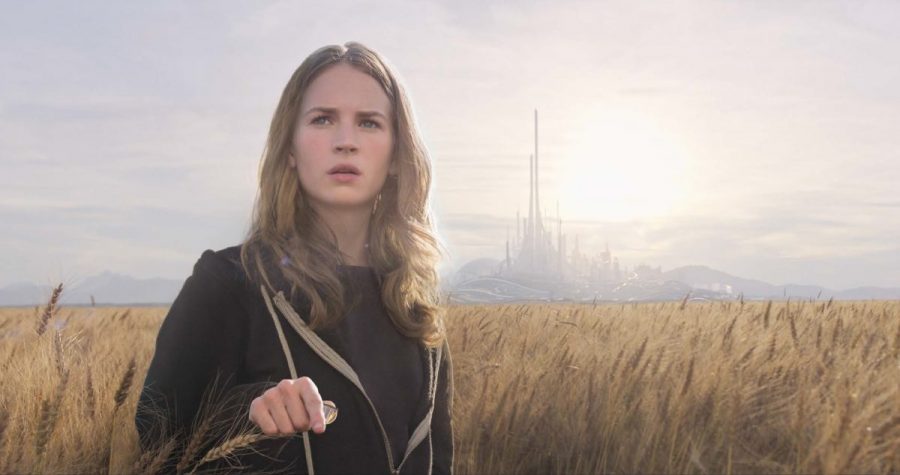Given that Tomorrowland is ostensibly about the future, it seems ironic that the strongest impression it leaves is that Brad Bird could make some gorgeous films about the past. Opening at the 1964 World’s Fair, the clean lines, on point design and vivid colour palette of Bird’s vision immediately call to mind his work with Pixar, or his 1950s-set animation The Iron Giant. The choice makes sense; carrying a near constant sense of hope, this is a film that looks back as much as forward. Finding its basis in a string of Disney attractions first launched in 1955, it calls upon an era of post-war optimism that has all but faded away. Or, as an opening voiceover puts it, a time before ‘everything went to hell’.
Frank Walker (George Clooney) is actually speaking of the fate of the titular Tomorrowland – a world free from restriction, where society’s best and brightest once strived for the betterment of mankind – but the implications for our own lives are clear. A former child genius (it is him we follow to the World’s Fair, eager to present his jetpack to the Hall of Invention), modern day Frank is long since jaded, his spirit broken by humanity’s seemingly unstoppable race toward self-destruction. Enter Casey Newton (Britt Robertson). A teenage girl of relentless positivity, by day she listens to teachers lecture on the perils of WMDs and climate change (none offering answer to her question: ‘can we fix it?’), whilst by night she sneaks into a nearby NASA site, determined to prevent its upcoming demolition. Drawing the attention of a young recruiter named Athena (Raffey Cassidy), Casey is granted a fleeting look at the possibilities of Tomorrowland; soon she is seeking out Frank, desperate to discover more.
Intriguingly, those specifics are something the film itself avoids for the majority of its running time. A bold approach at first, it leads to a slight anti-climax when what we do witness of Tomorrowland tends to feel somewhat familiar: all gleaming CGI towers and hover highways. There are some nice touches, particularly the hulking-yet-obedient robots, but we don’t see enough of them to take away much sense of their role, or the society itself – even if it does have Hugh Laurie in a pair of leather military jodhpurs. Instead, matters remain most exciting when this world collides with ours, at least for while. A fight amongst some Star Wars memorabilia (Disney love milking those licenses) provides enjoyable visuals, Athena revealing herself as a little girl warrior, but is soon forgotten. Meanwhile, faux Secret Service robo-goons stalk our heroes like agents from The Matrix given fake tans and whitened smiles: amusing and sinister at first, but the well soon runs dry.
The film largely centres on Casey’s reactions to all this. Like Mila Kunis in this year’s Jupiter Ascending, the role harks back to the Luke Skywalkers and Flash Gordons of old: an audience cypher taken on ride of wowing spectacle before turning hero. ‘Do I have to explain everything,’ Frank impatiently asks her, ‘can’t you just be amazed and move on?’ Yet when the finale comes, Brad Bird and Damon Lindelof’s script decides that explain it must, meeting us with an environmentalist message so on the nose that it resembles the unsightly spot in a Clearasil advert. As a species, we’ve resigned ourselves to a future that doesn’t ask anything of us today, now we are in danger of focusing on the outcome instead of creating one we want. Essentially: be the change you wish to see. Earnest it may be, but consider that Tomorrowland is largely aimed at children and it’s difficult to be too critical. It encourages us, like Frank, to remember past optimism and build a world beyond expectation, instead of beyond hope.
